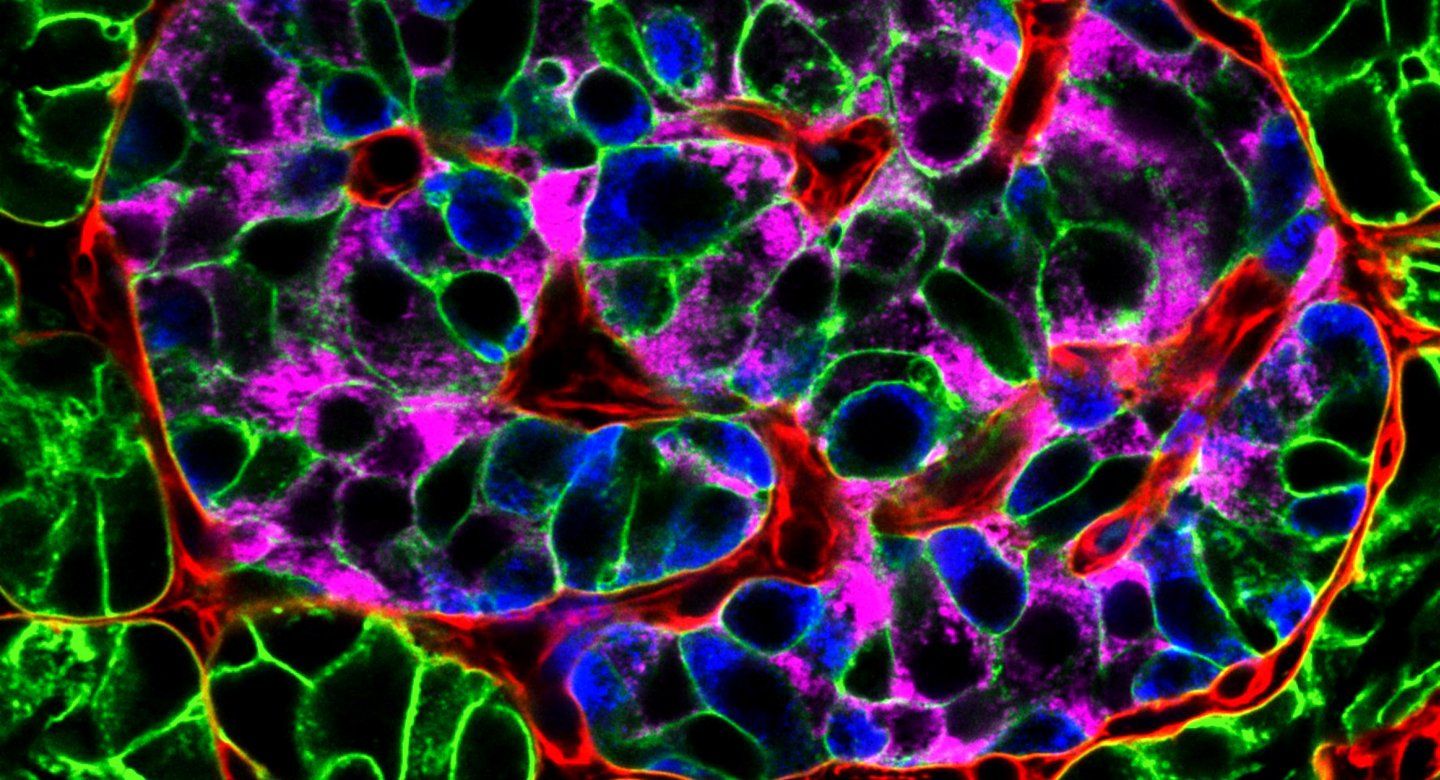This article is archived and only made available for historical reference. If you’d like to discover UCSF’s most recent advances in research, education and patient care, please visit the UCSF News Center.
Archive: Gene Discovery Solves 51-Year-Old Clinical Mystery
The cause of the pancreatic inflammation plaguing a rural California family has been a medical mystery since it was first described 51 years ago. Now genetic sleuth-work by researchers from UC San Francisco and the University of Chicago has solved the mystery: pointing to a novel gene mutation as the cause of the family’s inherited pancreatitis.
Pancreatitis is a disease that causes the pancreas to become inflamed, triggering severe abdominal pain. Long-term pancreatitis can cause the organ to stop functioning altogether, leading to diabetes, and in many cases, pancreatic cancer. It is most often caused by alcohol abuse, but several forms are caused by genetic mutations.
In 2012, Mark Anderson, MD, PhD, who earned his doctorates at UChicago and is now an endocrinologist and professor at the UCSF Diabetes Center, saw a patient in his clinic with diabetes and pancreatitis. She explained that it ran in her family — in fact, they had been written up in a study for the Annals of Internal Medicine in 1968. Doctors at UCSF had documented 71 members of the family — then living in a farming community around Northern California. Of the 18 people they examined, six were officially diagnosed with pancreatitis and another five were suspected of having the disease. The particular form of pancreatitis affecting this family was especially severe and struck at a young age; children suffering from it were said to come inside from the fields and collapse onto the floor in pain.
At the time, the researchers suspected that it was an autosomal dominant form of the disease, meaning that it could be inherited through a mutation in just one copy of a single gene. There was no way of proving this back then — before the advent of genetic sequencing — so the case was closed.
When Anderson and his colleagues realized their patient's connections to this classic study, they ordered genetic tests for the patient and several of her family members. Working together with Scott Oakes, MD, a former UCSF pathologist and cell biologist now on the faculty at UChicago, they screened the family for the five known genetic mutations that can cause inherited pancreatitis. None of them matched, but a new mutation in a gene that produces a digestive enzyme called elastase 3B emerged as a possible culprit.
What an exciting time to be a clinician and a scientist. You really can take things from the bedside to the bench and back this quickly.
Mark Anderson, MD, PhD
In the lab, the researchers used CRISPR-targeted gene editing to engineer mice that had either the normal or the mutated version of the gene for elastase 3B. They saw that the mutated form of the gene causes the pancreas to secrete too much of the enzyme, which damages the pancreas as it begins to digest itself. After 51 years, they had an answer for what was causing the unfortunate family’s misery.
“The tools to do genetic sleuthing now are just unbelievable,” said Anderson, who is the Robert B. Friend and Michelle M. Friend Endowed Chair in Diabetes Research at the UCSF Diabetes Center. “What an exciting time to be a clinician and a scientist. You really can take things from the bedside to the bench and back this quickly.”
The discovery was published in September in the Journal of Clinical Investigation. Oakes, who calls it a work of “medical archaeology,” says it’s also an opportunity to find new treatments for inherited forms of pancreatitis, a notoriously difficult disease to treat. Short of removing the pancreas — which has the equally problematic side effect of making the patient diabetic — or performing a pancreas or islet cell transplant, doctors can mostly just help patients manage their pain and symptoms.
“There are a lot of patients who still have what looks like inherited pancreatitis that don't have a genetic diagnosis — maybe some of these have mutations in elastase 3B,” Oakes said. “So, it has immediate implications not only for this family but potentially other families that have pancreatitis.”
Understanding how this mutation works could lead to solutions for more patients as well, Oakes said. New drugs could target the elastase 3B protein with an antibody or molecule that counteracts the extra enzymes.
“The presentation is so dramatic it’s possible that elastase 3B might be a good place to intervene in regular, garden-variety pancreatitis,” he said. “If you could tamp it down, maybe you could help control the disease in other patients.”
Oakes echoed Anderson’s sentiment about the advantage of working on such a problem at institutions like UChicago and UCSF, where physicians-scientists can see patients one day and work in a genetics lab the next.
“This reinforces the advantage of seeing patients and running a lab: You can let human genetics drive our understanding of this disease,” he said. “There are a lot of families like this in the medical literature where we still don't know the genetics. I think it is an exciting time now to figure out how to do that.”
Authors: Additional authors on the study include Paul C. Moore, Jessica T. Cortez, Chester E. Chamberlain, Diana Alba, Amy C. Berger, Zoe Quandt, Alice Chan, Mickie H. Cheng, Jhoanne L. Bautista, Justin Peng and Michael S. German from UCSF.
Funding: The research was supported by the National Institutes of Health (NIH), the Helmsley Charitable Trust, the Bern Schwartz Family Foundation and the Larry L. Hillblom Foundation.
Disclosures: German holds stock in Viacyte Inc. and Encellin Inc. Anderson holds stock in Medtronic and Merck. Oakes is a scientific co-founder of, equity holder in, and consultant for OptiKira LLC.
